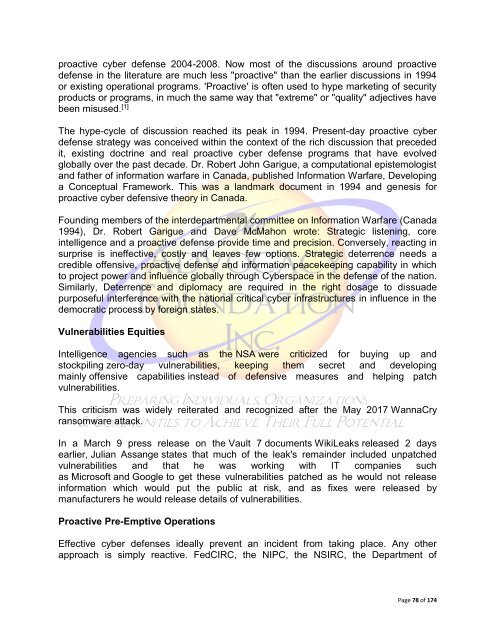International Cyber Terrorism
International Cyber Terrorism
International Cyber Terrorism
- No tags were found...
Create successful ePaper yourself
Turn your PDF publications into a flip-book with our unique Google optimized e-Paper software.
proactive cyber defense 2004-2008. Now most of the discussions around proactive<br />
defense in the literature are much less "proactive" than the earlier discussions in 1994<br />
or existing operational programs. 'Proactive' is often used to hype marketing of security<br />
products or programs, in much the same way that "extreme" or "quality" adjectives have<br />
been misused. [1]<br />
The hype-cycle of discussion reached its peak in 1994. Present-day proactive cyber<br />
defense strategy was conceived within the context of the rich discussion that preceded<br />
it, existing doctrine and real proactive cyber defense programs that have evolved<br />
globally over the past decade. Dr. Robert John Garigue, a computational epistemologist<br />
and father of information warfare in Canada, published Information Warfare, Developing<br />
a Conceptual Framework. This was a landmark document in 1994 and genesis for<br />
proactive cyber defensive theory in Canada.<br />
Founding members of the interdepartmental committee on Information Warfare (Canada<br />
1994), Dr. Robert Garigue and Dave McMahon wrote: Strategic listening, core<br />
intelligence and a proactive defense provide time and precision. Conversely, reacting in<br />
surprise is ineffective, costly and leaves few options. Strategic deterrence needs a<br />
credible offensive, proactive defense and information peacekeeping capability in which<br />
to project power and influence globally through <strong>Cyber</strong>space in the defense of the nation.<br />
Similarly, Deterrence and diplomacy are required in the right dosage to dissuade<br />
purposeful interference with the national critical cyber infrastructures in influence in the<br />
democratic process by foreign states.<br />
Vulnerabilities Equities<br />
Intelligence agencies such as the NSA were criticized for buying up and<br />
stockpiling zero-day vulnerabilities, keeping them secret and developing<br />
mainly offensive capabilities instead of defensive measures and helping patch<br />
vulnerabilities.<br />
This criticism was widely reiterated and recognized after the May 2017 WannaCry<br />
ransomware attack.<br />
In a March 9 press release on the Vault 7 documents WikiLeaks released 2 days<br />
earlier, Julian Assange states that much of the leak's remainder included unpatched<br />
vulnerabilities and that he was working with IT companies such<br />
as Microsoft and Google to get these vulnerabilities patched as he would not release<br />
information which would put the public at risk, and as fixes were released by<br />
manufacturers he would release details of vulnerabilities.<br />
Proactive Pre-Emptive Operations<br />
Effective cyber defenses ideally prevent an incident from taking place. Any other<br />
approach is simply reactive. FedCIRC, the NIPC, the NSIRC, the Department of<br />
Page 78 of 174
















